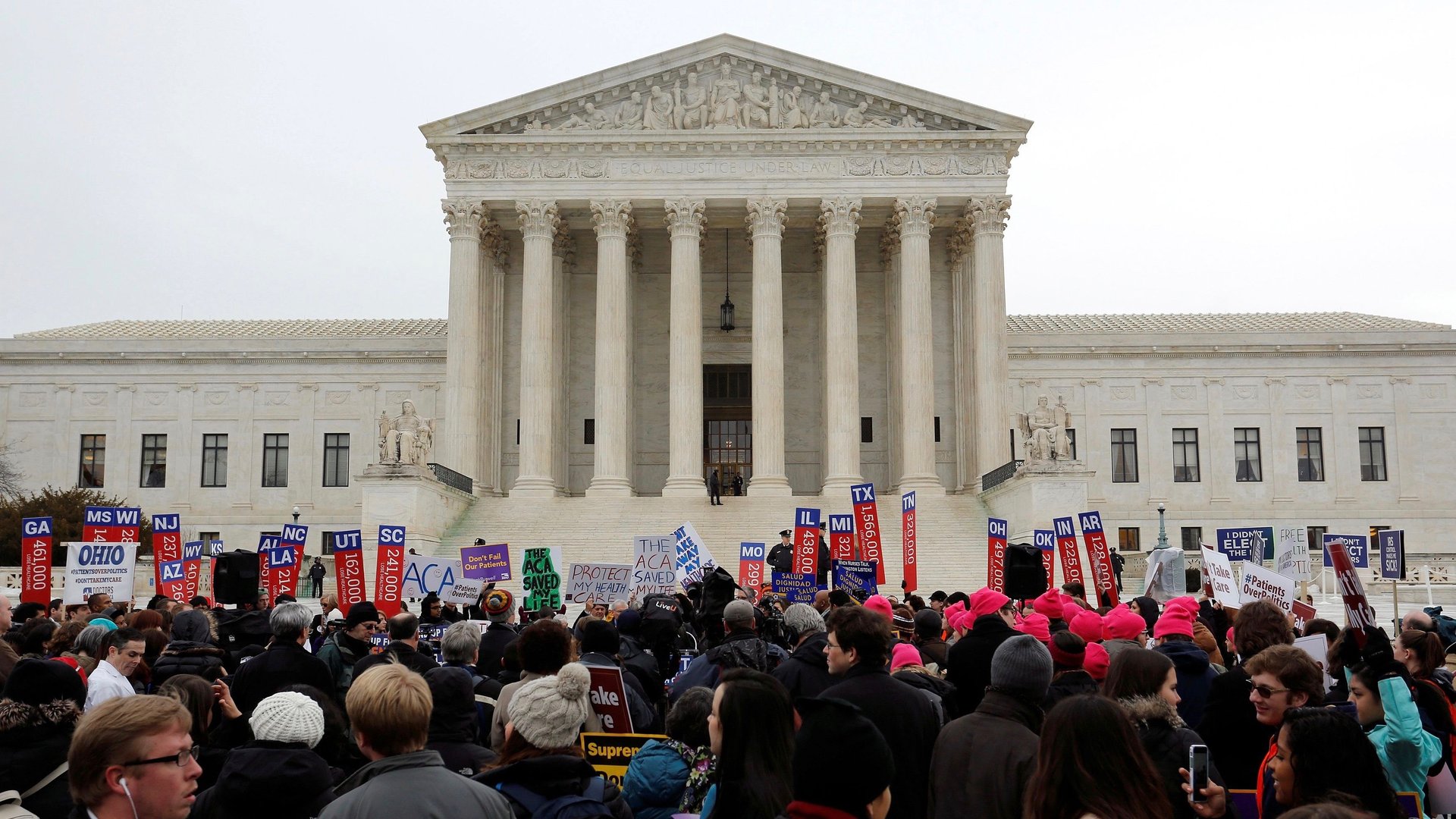The fate of national healthcare is in the US Supreme Court’s hands—again
In the decade since its enactment in 2010, the Affordable Care Act, or Obamacare, has been the subject of numerous legal battles between Republicans who oppose it and Democrats who support it. The war over the national health insurance program continues in 2020, and now the Supreme Court must now decide whether to join the fray—again.


In the decade since its enactment in 2010, the Affordable Care Act, or Obamacare, has been the subject of numerous legal battles between Republicans who oppose it and Democrats who support it. The war over the national health insurance program continues in 2020, and now the Supreme Court must now decide whether to join the fray—again.
If it does take the latest case in this epic struggle, the high court’s decision could reshape the national healthcare landscape, and rapidly.
On Jan. 6, the court ordered the state of Texas, the federal government, and others challenging the ACA to respond to motions filed late last week by 20 states (pdf) and the House of Representatives seeking expedited review of a December federal appeals court ruling that puts the fate of the healthcare program in jeopardy. The respondents have until Jan. 10 to explain why they oppose the requests for swift review and resolution.
Lawmakers in the Democratic-majority House and states with Democratic attorneys general who want the court to take the case say that the Fifth Circuit Court of Appeals ruling creates confusion in the healthcare marketplace, impacting a fifth of the US economy, millions of individuals who make major life decisions based on insurance considerations, states, and businesses. “[U]ncertainty threatens adverse consequences for patients, providers, and insurers nationwide,” they wrote.
Supporters of Obamacare want the justices to take and decide the case as swiftly as possible, by the term’s end in June—and, critically, for the high court to save the healthcare legislation once again.
John Roberts to the rescue?
In 2012, conservative chief justice John Roberts was the surprise deciding vote in a case that found the national health care law’s mandate that all Americans acquire individual insurance constitutional. The law required people to get health insurance or otherwise pay a tax to the Internal Revenue Service. Roberts reasoned that the tax was within Congress’s constitutional power, and therefore legal.
The 5-4 decision essentially saved the national healthcare legislation.
But in 2017, a Republican-controlled Congress amended that taxing provision. The tax on people who didn’t purchase insurance was changed to zero. Although the requirement to get insurance still stood, there was no legal mechanism to enforce it or penalty for anyone who didn’t comply.
Challengers to the law, including Texas, then argued that the tax change rendered the provision unconstitutional. Instead of being a tax, as Roberts had reasoned, it was a mandate to buy insurance, invalidating the whole ACA. A federal district court agreed, finding the individual mandate unconstitutional and striking down the ACA entirely.
On appeal, a divided panel of Fifth Circuit judges agreed that the now-toothless taxing provision was unconstitutional but sent the case back for further analysis. Specifically, it asked the lower court to decide whether the elimination of the tax impacts the rest of the legislation. In other words, it asked the lower court to consider whether the tax provision is severable or if its unconstitutionality renders the whole national healthcare system illegal.
An unusual request
Technically, this matter isn’t ripe for high court review because the district court’s analysis hasn’t happened yet. But the states and lawmakers who appealed to the Supreme Court last week argue that the justices cannot wait for the analysis and for matters to make their way up to the high court. That could take years and will create chaos for individuals, businesses, and states, they say.
They want the high court to step in quick and work fast to save the national health insurance program now. The now Democrat-controlled House of Representatives’ petition to the high court argues that the Fifth Circuit decision allows Obamacare challengers to wage “interminable (and unnecessary) provision-by-provision trench warfare” on the ACA in the district court, throwing the rest of the nation into chaos.
From their perspective, it’s evident that Congress didn’t intend to invalidate the whole ACA by changing the tax to zero in 2017, as Congress also specifically decided at the time not to repeal the entire national healthcare law. All that happened as a result of congressional action then was that there was no more enforceable penalty for a person who didn’t comply with the insurance mandate, they argue.
The lawmakers accuse the Fifth Circuit of abdicating its responsibility to decide the case and creating “an intolerable situation” that will impact millions of Americans and the national economy. “The debilitating effects of massive uncertainty will persist for years if the Court does not grant review now,” their petition states.
Still, the justices have a lot on the docket already and they don’t have to take the case. Whatever they decide, we should know within weeks for scheduling reasons whether uncertainty will hang over the law for years to come or just some months.